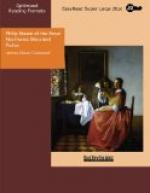“Coffin box, sir. Only thing the maps’d fit into, and it’s been layin’ around useless since MacVee kem down in it Mebby you can find use for it, later,” he chuckled grewsomely. “Ho-ho-ho! mebby you can!”
A moment later the box was lifted and Philip knew that he was being carried up a step and through a door, then with a suddenness that startled him he found himself standing upright. His prison had been set on end!
“Not that way, man,” objected Hodges, for Philip was now certain that he was in the presence of the chief of construction. “Put it down—over there in the corner.”
“Not on your life,” retorted Fingy, cracking his finger bones fiercely. “See here. Mister Hodges, I ain’t a coward, but I b’lieve in bein’ to the dead, ‘n’ to a box that’s held one. It says on that red card, ‘Head—This end up,’ an’, s’elp me, it’s going to be up, unless you put it down. I ain’t goin’ to be ha’nted by no ghosts! Ho, ho, ho—” He approached close to the box. “I’ll take this red card off, Mister Hodges. It ain’t nat’ral when there ain’t nothing but maps ‘n’ things in it.”
If the cloth had not been about his mouth, it is possible that Philip would not have restrained audible expression of his astonishment at what happened an instant later. The card was torn off, and a ray of light shot into his eyes. Through a narrow slit not more than a quarter of an inch wide, and six inches long, he found himself staring out into the room. The. Fingy was close behind him. And in the rear of these two, as if eager for their departure, was Hodges, chief of construction. No sooner had the men gone than Hodges turned back to the table in the center of the office. It was not difficult for Philip to see that the man’s face was flushed and that he was laboring under some excitement. He sat down, fumbled over some papers, rose quickly to his feet, looked at his watch, and began pacing back and forth across the room.
“So she’s coming,” he chuckled gleefully.
“She’s coming, at last!” He looked at his watch again, straightened his cravat before a mirror, and rubbed his hands with a low laugh. “The little beauty has surrendered,” he went on, his face turning for an instant toward the coffin box. “And it’s time—past time.”
A light knock sounded at the door, and the chief sprang to open it. A figure darted past him, and for but a breath a white, beautiful face was turned toward Philip and his prison—the face of the young woman whom he had seen but two hours before in Le Pas, the face that had pleaded with him that night, that had smiled upon him from the photograph, and that seemed to be masked now in a cold marble-like horror, as its glorious eyes, like pools of glowing fire, seemed searching him out through that narrow slit in the coffin box.
Hodges had advanced, with arms reaching out, and the woman turned with a low, sobbing breath breaking from her lips.
Another step and Hodges would have taken her in his arms, but she evaded him with a quick movement, and pointed to a chair at one side of the table.




